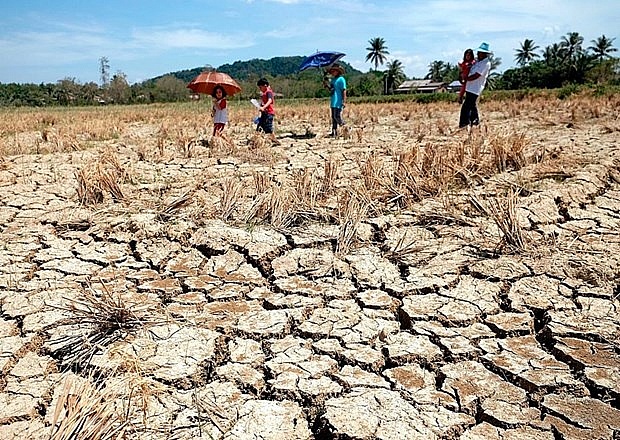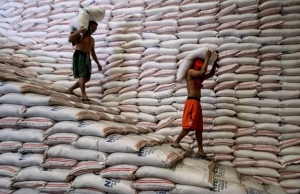El Nino costs Philippine agriculture up to nearly 19 mln USD
 |
| El Nino costs Philippine agriculture up to nearly 19 mln USD (Photo: VNA) |
Hanoi – The Philippine government on March 6 said that the El Nino dry spell and drought has cost Philippine agriculture over 1 billion PHP (nearly 19 million USD) while the climate pattern may persist till the second quarter this year.
The National Disaster Risk Reduction and Management Council said El Nino has affected over 23,000 farmers and fisherfolk, and damaged nearly 18,000 hectares of crop areas in five regions across the country.
The Western Visayas region in the central Philippines reported the highest cost of agricultural damage, followed by the areas in the main Luzon Island and Zamboanga Peninsula in the south of Philippines.
The state weather bureau declared the start of the El Nino phenomenon in July last year. According to the bureau, most global climate models suggest that El Nino will likely persist until the March-April-May 2024 season.
On March 5, National Economic and Development Authority Secretary Arsenio Balisacan voiced concern over the potential impact of a strong El Nino weather pattern on food prices.
The Philippine Statistics Authority data showed that year-on-year inflation in the country rose to 3.4% in February, while rice remained the top contributor to the higher inflation rate, recording a 23.7% price rise, the highest since February 2009.
The government is intensifying its efforts to mitigate the effects of the El Nino phenomenon and help keep the inflation rate within target, Balisacan added.
 | Philippine landslide death toll rises to over 90 The death toll from a massive landslide that hit a gold mining village in Davao de Oro, the Philippines has climbed to 92 while rescue work is underway for tens of others, the local government reported on February 15. |
 | Philippine officials suspended over rice scandal The Office of the Ombudsman has ordered the preventive suspension of the National Food Authority (NFA) head and 138 other officials and employees for their alleged involvement in a sale of rice buffer stocks, Philippine Agriculture Secretary Francisco Tiu Laurel said on March 4. |
What the stars mean:
★ Poor ★ ★ Promising ★★★ Good ★★★★ Very good ★★★★★ Exceptional
 Tag:
Tag:
Related Contents
Latest News
More News
- Foreign leaders extend congratulations to Party General Secretary To Lam (January 25, 2026 | 10:01)
- Russian President congratulates Vietnamese Party leader during phone talks (January 25, 2026 | 09:58)
- Worldwide congratulations underscore confidence in Vietnam’s 14th Party Congress (January 23, 2026 | 09:02)
- Political parties, organisations, int’l friends send congratulations to 14th National Party Congress (January 22, 2026 | 09:33)
- 14th National Party Congress: Japanese media highlight Vietnam’s growth targets (January 21, 2026 | 09:46)
- 14th National Party Congress: Driving force for Vietnam to continue renewal, innovation, breakthroughs (January 21, 2026 | 09:42)
- Vietnam remains spiritual support for progressive forces: Colombian party leader (January 21, 2026 | 08:00)
- Int'l media provides large coverage of 14th National Party Congress's first working day (January 20, 2026 | 09:09)
- Vietnamese firms win top honours at ASEAN Digital Awards (January 16, 2026 | 16:45)
- ASEAN Digital Ministers' Meeting opens in Hanoi (January 15, 2026 | 15:33)






















 Mobile Version
Mobile Version